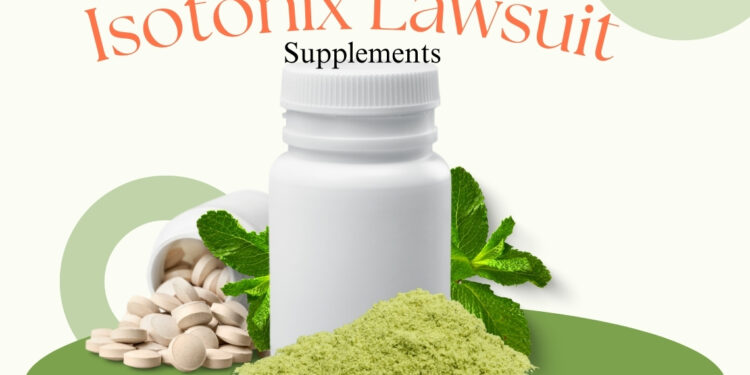Isotonix is a line of dietary supplements that promise faster absorption and better results than regular pills or capsules. These products are sold as powders that you mix with water, and the company claims they mimic the body’s fluids, making them easier for your body to take in.
What Isotonix Is and Who Owns It?
The Isotonix line includes vitamins, minerals, antioxidants, and specialty formulas aimed at improving energy, digestion, immune health, and more. You’ll often hear health claims like “scientifically advanced” or “maximum delivery system” used to promote them, but many of these claims haven’t been officially proven or approved by regulatory bodies like the FDA.
Who owns Isotonix?
The brand is owned by Market America, a North Carolina-based company that started in 1992. Market America describes itself as a “product brokerage and internet marketing company.” It sells a wide range of wellness, beauty, and home products under different brand names, with Isotonix being one of its flagship lines.
How is Isotonix sold?
Isotonix products aren’t sold in stores. Instead, they’re marketed through a business model called multi-level marketing (MLM). This means regular people can become “distributors” and earn money by selling the products and by recruiting others to sell under them. This kind of model can sometimes raise legal and ethical questions, especially when most of the income comes from recruitment rather than product sales.
This MLM structure is at the heart of the current legal issues surrounding Isotonix and Market America. Critics claim that the system looks more like a pyramid scheme, which is illegal, where only those at the top make real money, while most sellers struggle to break even.
The Lawsuit Against Isotonix: What Happened
In recent years, Isotonix and its parent company, Market America, have faced serious legal trouble. Accusations that the company is operating a pyramid scheme and misleading people through its business model and product marketing.

When did the lawsuit start?
The legal action began picking up steam in 2020, when concerns about the company’s business practices reached federal regulators and courtrooms. Several class action lawsuits and regulatory investigations followed, shining a spotlight on how Isotonix is sold and promoted.
Who filed the lawsuit and why?
Former distributors and consumer protection lawyers are the main groups behind the lawsuits. They argue that Market America promised people a chance to “get rich” by selling Isotonix and other products, but in reality, most people lost money.
The plaintiffs claim that the system was never truly about product sales. Instead, it focused heavily on recruiting new sellers, who had to spend large amounts of money on startup kits, events, and inventory, all while chasing unrealistic income dreams.
What are the key claims in the lawsuit?
Here are the major accusations being made:
- Pyramid scheme structure: The lawsuits argue that the company relies too much on recruitment instead of actual product sales. This is a red flag that often leads to pyramid scheme accusations.
- False income promises: Market America allegedly told sellers they could earn six-figure incomes, but in reality, most people made little to no profit.
- Misleading product marketing: The company is also accused of promoting Isotonix with unverified health claims that make the supplements sound more effective than they are.
These claims have led to growing legal pressure and public concern, especially for people who invested their time and money into the business. If proven in court, the company could face major fines and changes to how it operates.
FDA & FTC Involvement: Warnings to Market America
In February 2020, the U.S. Food and Drug Administration (FDA) sent an official warning letter to Market America, the company behind Isotonix. This letter was a big deal it highlighting serious problems with how the company was promoting and labeling its supplements, including the popular Isotonix line.
What did the FDA warning say?
The FDA found that Market America was making unapproved drug claims about Isotonix products. That means the company was promoting the supplements as if they could treat, prevent, or cure real medical conditions, which is not allowed without scientific proof and official approval.
For example, some Isotonix products were advertised as helping with:
- Heart disease
- High blood pressure
- Diabetes
- Inflammation
- Even cancer in some cases
These kinds of health claims are considered dangerous because they can mislead consumers into thinking they don’t need real medical treatment.
Labeling and product issues
The FDA also pointed out that the labeling on some Isotonix products was misleading. This included:
- Improper instructions for use
- Missing disclaimers
- Scientific-sounding terms with no backup evidence
The letter gave Market America a deadline to respond and fix these issues or face further legal action, including possible product recalls or fines.
What about the FTC?
The Federal Trade Commission (FTC) has also shown interest in how Market America and its distributors promote Isotonix, especially during health crises like COVID-19. At times, independent sellers were caught making illegal health claims on social media, suggesting that Isotonix could help prevent viruses or boost immunity beyond what’s proven.
The FTC has warned several MLM companies (not just Market America) about this type of behavior, especially when public health is at risk.
In short, both the FDA and FTC have put Market America under the microscope, warning the company to stop making false health claims and clean up its marketing tactics.

Pyramid Scheme Accusations: Does Market America Cross the Line?
What is a pyramid scheme?
A pyramid scheme is a type of illegal business model where the main focus is on recruiting new members, rather than selling actual products or services. In these setups, people are promised big profits for bringing in others, but very few ever make real money.
Instead of earning money from product sales, most participants end up spending their own cash on starter kits, training, or inventory. Over time, the system collapses because it becomes impossible to keep recruiting enough new people to pay the ones above.
How do Market America and Isotonix fit into these claims?
Market America uses a multi-level marketing (MLM) model, which is legal but only when most of the money comes from real product sales, not recruiting.
Critics and former sellers argue that Market America crosses the line by:
- Focusing heavily on recruitment: Distributors are pushed to bring in new members instead of just selling Isotonix products.
- High startup and event costs: Many sellers report spending thousands on events, training, and stock, with little or no return.
- Unrealistic income promises: Some marketing materials claim people can earn six or seven figures, but most earn far less, if anything at all.
Because of these issues, some lawsuits and watchdog groups claim that Market America’s system functions more like a pyramid scheme than a real sales business.
Read also: Pedro Paulo Executive Coaching: Your 2026 Leadership Advantage
Other MLM companies with similar legal problems
Market America isn’t alone. Other big MLM companies have faced similar pyramid scheme accusations, including:
- Herbalife: In 2016, the FTC fined Herbalife $200 million for misleading business practices and forced it to change how it operated.
- AdvoCare: In 2019, AdvoCare agreed to pay $150 million and was banned from MLM after being labeled a pyramid scheme by the FTC.
- LuLaRoe: This fashion MLM faced lawsuits over its recruitment-focused structure and was ordered to pay millions in refunds.
These cases show how easy it is for MLMs to cross the legal line, and why companies like Market America are now under the spotlight.
What This Means for Distributors and Customers
The legal issues surrounding Isotonix and Market America don’t just affect the company. They have a direct impact on the people who sell and use these products. Whether you’re a distributor, a potential seller, or a regular customer, it’s important to understand the risks involved.
Risks for current and future sellers
For anyone thinking about becoming a distributor (or who already is), the biggest risk is losing money. Lawsuits and investigations have revealed that many people who join Market America’s system:
- Invest thousands of dollars in events, training, and products
- They are told they’ll make high profits, but don’t see a real return
- Struggle with monthly sales quotas or pressure to recruit others
- End up stuck with unsold inventory or subscription fees
With legal action still unfolding, there’s also a risk that the company could face fines or restrictions that would affect its entire MLM structure. That could mean changes in how distributors are paid, what they can claim, or even whether they’re allowed to keep selling.
Impact on consumer trust and product use
For customers, the main concern is product credibility. When a company is accused of making false health claims, trust is lost fast.
Here’s why that matters:
- People want supplements they can trust, especially when it comes to their health
- FDA warnings raise red flags about how safe or effective the products are
- If the company has to change its formulas or labels, it could affect how the products work
Even loyal customers might start to question whether they’re buying a quality product or just supporting a shady business model.
In short, these legal issues are more than just headlines; they could change the future of Market America, its distributors, and everyone using Isotonix.
Market America’s Response to the Lawsuit
Public Statements
After the lawsuit gained public attention, Market America did speak out to defend its position. The company firmly denied the accusations and said that it runs a legal and ethical multi-level marketing (MLM) business. They highlighted that thousands of independent distributors rely on their platform and that they always aim to follow FTC guidelines.
In interviews and press releases, Market America stated that the claims in the lawsuit did not reflect how they actually operate. The company reassured both UnFranchise owners and customers that their business opportunity is real and based on product sales, not recruitment alone.
Any Changes Made to the Business Model or Labeling

Following the legal pressure, Market America made several internal changes to strengthen compliance. One major update was to their income disclosure statements. Now, new distributors are shown a more realistic picture of what they can earn, helping them make better decisions.
They also improved product labeling and marketing materials. This includes being more careful with health claims, especially for nutritional supplements and wellness products. Any claim now needs to be backed by science or approved by health regulators.
Besides that, Market America has updated its training materials, helping distributors stay within legal limits when promoting the business or products. These efforts show the company’s push to keep its MLM model transparent and within legal MLM practices.
Overall, while the lawsuit brought a lot of attention, it also led to positive steps towards more honesty, better product labeling, and stronger compliance with direct selling rules.
Timeline of Key Events in the Isotonix Lawsuit
- March 2017 – Lawsuit Filed
A consumer lawsuit was filed against Market America, claiming that the company misled people with false income promises and exaggerated health claims related to Isotonix products. - May 2017 – FDA Warning Letter
The U.S. Food and Drug Administration (FDA) sent a warning to Market America, pointing out that some Isotonix supplement claims were unapproved and misleading. The letter demanded corrections in marketing and product labeling. - 2018 – Class Action Lawsuit Certified
A class action lawsuit was formed, with more plaintiffs joining in. The case argued that Market America was operating like an illegal pyramid scheme, focusing more on recruiting than product sales. - 2020 – Market America’s Official Response
The company denied all allegations and stated that its UnFranchise system was fully compliant with U.S. laws. They also updated their income disclosure and marketing guidelines. - 2021 – Court Ruling and Settlement Talks Begin
A U.S. court allowed parts of the lawsuit to move forward. At the same time, both sides entered settlement discussions, trying to avoid a prolonged legal battle. - 2022 – Business Model Adjustments
Market America rolled out new compliance training for distributors, revised health claims on Isotonix products, and improved labeling standards. - 2023 – Ongoing Monitoring
The company continues to be monitored for regulatory compliance, especially related to MLM income claims, product labeling, and health supplement advertising.

Similar Cases in the Supplement and MLM World
Legal issues like the one faced by Market America aren’t new in the multi-level marketing (MLM) and dietary supplement world. Let’s take a quick look at a few well-known cases and what we can learn from them.
Herbalife – FTC Investigation & $200 Million Settlement
In 2016, Herbalife agreed to a massive $200 million settlement with the Federal Trade Commission (FTC). The FTC found that Herbalife had misled distributors with income claims and focused more on recruiting than retail sales. The company was forced to change its business structure and operate with more transparency.
Advocare – Banned from MLM Model
In 2019, Advocare, a supplement and wellness brand, was hit with a strong action by the FTC. They were accused of operating a pyramid scheme and agreed to pay $150 million in penalties. The company had to abandon its MLM structure entirely and switch to a traditional retail model.
Market America – Ongoing Legal Scrutiny
Market America’s Isotonix lawsuit is part of a growing pattern where supplement-focused MLMs face legal trouble for false product claims, income exaggeration, and lack of transparency.
Key Takeaways for Consumers and Entrepreneurs
- Research before joining: Always investigate an MLM company’s income disclosure and legal history.
- Avoid big income promises: Be careful if you’re told you’ll make “easy money.” Most earnings in MLMs are low or negative.
- Focus on product value: A healthy MLM business should focus on real product demand, not endless recruiting.
- Check for compliance: Make sure the company follows FDA and FTC guidelines, especially for health supplements.
Final Conclusion: What You Need to Know Before Trusting Isotonix
The Isotonix lawsuit isn’t just another legal headline; it’s a serious reminder of how complex and risky the MLM supplement industry can be. From FDA warnings about unapproved health claims to accusations of pyramid scheme practices, Market America has faced intense scrutiny over how it promotes both its products and its business opportunity.
Whether you’re thinking about using Isotonix supplements or becoming a distributor with Market America, it’s crucial to look beyond the marketing hype. Ask the hard questions:
- Are the health claims backed by science?
- Is the income opportunity realistic?
- Are you being encouraged to sell — or just to recruit?
While the company has taken steps to improve transparency and compliance, the red flags from past legal actions shouldn’t be ignored. Regulatory watchdogs like the FDA and FTC don’t issue warnings lightly, and their involvement signals deep concerns that potential customers and sellers must take seriously.
FAQs
Can I join a class action against Isotonix?
Yes, if you qualify as an affected distributor or customer, you may be eligible to join the ongoing class action.
Are Isotonix products still being sold?
Yes, Isotonix supplements are still available through Market America’s online platform and distributors.
Is Market America still operating?
Yes, Market America continues to operate despite the legal challenges.
Is Isotonix safe to use?
While many users report no issues, the FDA has raised concerns about unapproved health claims, so caution is advised.
Read suggestion..Galadriel: The Timeless Elven Queen of Middle-earth









































